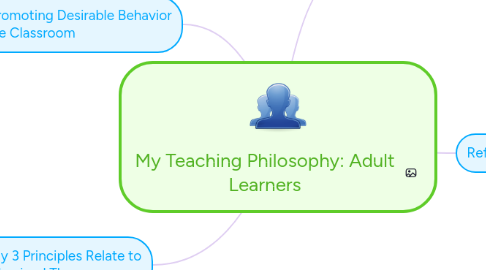
1. Promoting Desirable Behavior in the Classroom
1.1. Exam scores include 5 points from participation/class attendance. Students will be penalized 5 points on every exam if they do not attend atleast 80% of the associated lectures (Intrinsic reinforcement)
1.2. Establish a predictable daily routine and adequate test preparation to reduce anxiety
1.3. Make adaptions to lectures and instructions as needed. Allow for input from students. Give opportunities to learn from each other by assigning a group project
2. How My 3 Principles Relate to Social/Behavioral Theory
2.1. 1. Positive/Negative Reinforcement
2.1.1. Skinner's Theory of Operant Behaviorism: this theory proposes that we do something because the consequences are desirable, so the behavior is likely to be repeated (Ormrod, 2013). Assigning points for consistent excellent performance and sufficient preparation will encourage students to be more diligent with their studying. Additionally, removing the negative stimuli of a final exam will entice students to behave (and prepare/participate) in such a way in order to avoid it.
2.2. 2. Promote classroom involvement and interest by assigning 5 points to participation for each exam and group work in which all students in the group receive the same grade for the assignment
2.2.1. Bandura's Social Cognitive Theory: considers reasoning and motivation involved in behaviorism. Proposes that learning happens as a result of social interaction; people learn by observing others. Learning acceptable behaviors in the classroom leads to socially accepted behavior (Ormrod, 2013).
2.3. Establish a predictable routine to reduce anxiety
2.3.1. Positive behavioral support: predictability helps students feel comfortable and secure in the classroom, thus allowing more mental capacity for success (Ormrod, 2013).
3. Promoting Academic Success
3.1. Positive Reinforcement
3.1.1. Extra 1 point added to final exam for every A (90% and above) achieved on exams throughout the course
3.2. Negative Reinforcement
3.2.1. Students will not be required to take the final exam if they achieve a 94% or higher on all prior exams and maintained an overall average of 94% or higher in the course
3.3. Reasoning
3.3.1. Reinforcement has been shown to have longer lasting effects on behavioral changes than punishment. This is most appropriate for adult learners as well.

